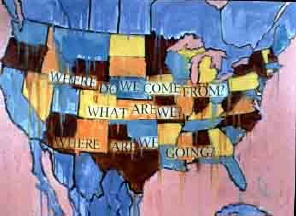|
Attendance at 2 Native American -oriented outside events are required.
I'll add them as I learn about them.
You can receive extra credit for attending and writing about additional events.
Texts:
Excerpts from Stories that Make the World: Oral
Literatures of the Indian Peoples of the Inland Northwest, Aripa,
Yellowtail, et al, Edited by Rodney Frey as PDF's
A Little Bit of Wisdom: Conversations with a Nez
Perce Elder, Axtell and Aragon
Perma Red,
Debra Magpie Earling (Salish)
The Lesser Blessed, Sherman Alexie (Spokane/Coeur d'Alene)
Winter in the Blood, James Welch (Blackfoot/Gros Ventre)
Trickster: Native American Tales, A Graphic Collection
Attendance and Participation (25% of grade):
Consistent attendance is required. Please email me if you are ill or have a
family emergency; these absences will be excused up to a point. If you have 5 unexcused absences you will fail the course.
Active participation is required, as the course is
based on students' discussion of texts. Read all assignments in advance of class
and always bring your text to class. For each reading, prepare a comment and
question on the text to be discussed. If you don't like to write in your books,
keep a reading journal specifically for this purpose. This will prepare you for
class discussions. I may occasionally give short (typed) writing assignments.
Attendance at Events (5% of grade):
You are required to attend at least two course-related event on campus and
submit a 2-3 page typed (double-spaced) report of what you experienced and
how it relates to our course. You can earn extra credit by attending more than two
events. I will add Native-oriented events to our "Campus Events" button as
I become aware of them.
Group Presentations (15%)
You'll be assigned a text or essay to research and present to the class, as
in a Graduate Seminar. Essentially you'll teach the rest of the class what
you have learned. Supply the class with a handout--a summary of your
presentation. 20-30 mins.
Essay Exams (30% of grade):
You will write three short essays of approximately 5-6 pages. I will provide
topics you can choose from.
A
Researched Essay or Multi-media Project, individual or group (25% of grade):
You will write one researched essay on a text, genre, or issue relevant to
the course (see Final Project button). You will submit a 1-2 page
proposal that will become an 8- 10 page researched essay (MLA format)
Directions for Final Paper Proposal and Final Paper
Proposal and Paper Assignment
Proposal: Submit a formal, typed (double-spaced, no
more than 3 pages) paper proposal in which you tell me your idea for your
researched essay: what problem or issue(s) do you plan to write about?
******Include a summary of an article you've read on this issue, that includes:
Name of author
Title of article
Source (journal title)
3 major ideas from
the article, and the potential specific usefulness of this
article for the
research essay.
In addition to the article report, provide a list of primary and additional secondary sources
you may use in your essay. You do not need a specific thesis at
this time, but rather an idea or a "burning question" you want to answer regarding some element of
Native literature and life. The clearer you are, the more helpful the feedback I
can give you.
Paper: Research and write a 8-10 page (plus Works Cited
page) essay in MLA format. Your essay should be problem-based (see Final
Project button). Create a topic you wish to learn more about, or a
"burning question" you want to answer. Then create a thesis based on it. You may focus on an author or group of
authors, an issue or theme(s) (e.g., ceremony/the sacred, the legacy of
colonialism in Native life, humor, historical trauma and healing, decolonization
and empowerment, survivance, family and identity) or some other topic you
create. You must use at least one primary source (novel, poem, story) and at least two secondary
sources (written about your topic and primary source).
| 